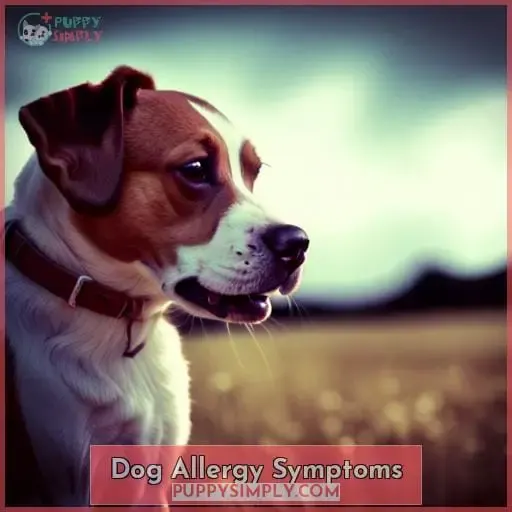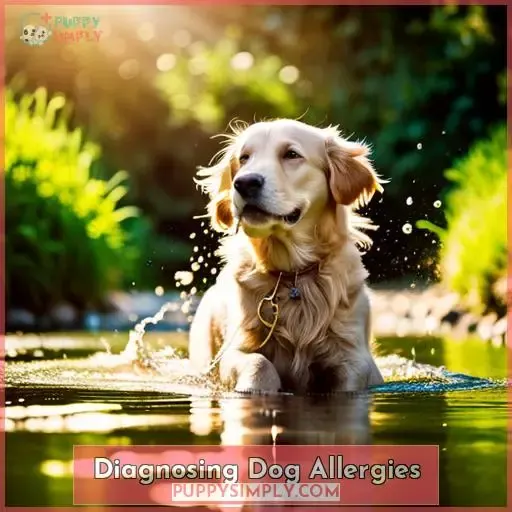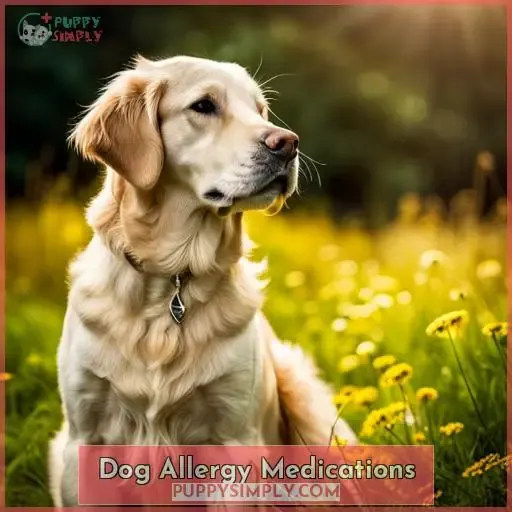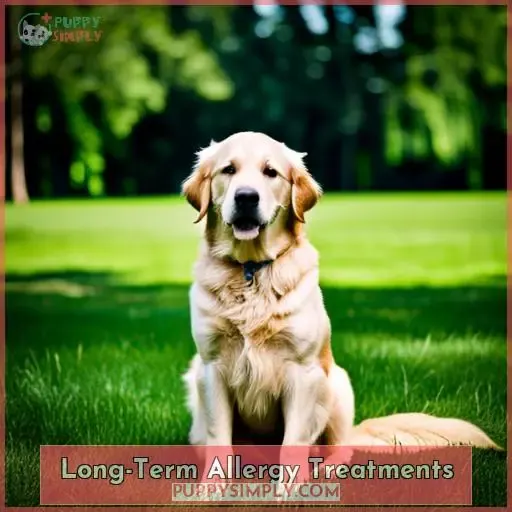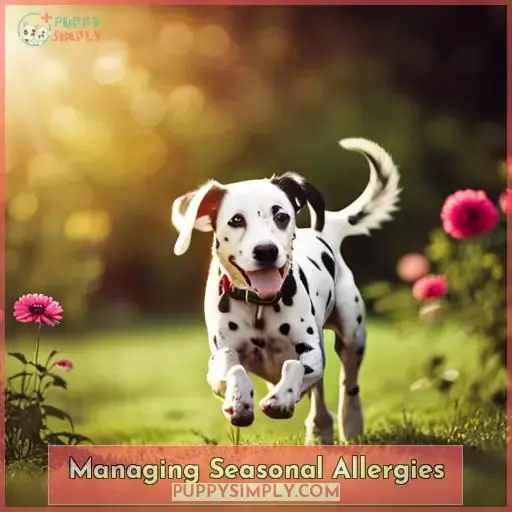This site is supported by our readers. We may earn a commission, at no cost to you, if you purchase through links.
 Oh no, your poor pup can’t stop scratching! You’ve tried everything, but Fido’s incessant itching from allergies is driving you both crazy. As a dog owner, you’d move mountains to ease your best friend’s suffering. While allergies can’t always be cured, you can find relief with the right treatments.
Oh no, your poor pup can’t stop scratching! You’ve tried everything, but Fido’s incessant itching from allergies is driving you both crazy. As a dog owner, you’d move mountains to ease your best friend’s suffering. While allergies can’t always be cured, you can find relief with the right treatments.
Talk to your vet about antihistamines, medicated shampoos, and immunotherapy vaccines to get your pup some much-needed itch relief. With a customized plan, your dog’s allergy symptoms will be calmer, and their quality of life happier.
Table Of Contents
Key Takeaways
- Identify allergy triggers like pollen, dust, food to avoid reactions
- Antihistamines like Benadryl can provide relief from itchiness and inflammation
- Steroids like prednisone offer quick but temporary relief of allergy symptoms
- Long-term management may involve immunotherapy, dietary changes, supplements
Dog Allergy Symptoms
Let’s start with some of the most common symptoms of dog allergies you may notice. Dogs with allergies often experience irritation and inflammation in their respiratory systems, such as consistent sneezing and coughing, as well as itchy skin that leads to hair loss and excessive scratching or biting.
Itchy Skin
Your poor pup’s skin gets so itchy and irritated during allergy season, doesn’t it? A soothing oatmeal bath can provide temporary relief, but you should consult your vet about medicated shampoos or allergy pills to address the underlying cause.
Some topical balms also help moisturize and protect sensitive skin. With the appropriate treatment plan, you can maintain your dog’s skin healthy and comfortable despite seasonal allergies.
Sneezing & Coughing
The sniffles plague your dog constantly as sneezes shake their whole body. Allergies trigger fits of sneezing and coughing in canines. Identifying allergy triggers like pollen or dust helps prevent episodes. Natural remedies like honey, supplements, or air filters soothe coughing.
Consulting your vet for allergy medicine if sneezing and coughing persist despite prevention efforts is advisable.
Diagnosing Dog Allergies
You’re sniffling as the vet inspects your pup’s runny nose and inflamed ears.
To properly diagnose dog allergies, here are 3 key steps:
- Thorough symptom assessment. The vet will check for common allergy signs like itchy skin, ear infections, sneezing, and upset stomach.
- Diagnostic testing. Skin or blood allergy tests can pinpoint specific triggers. Intradermal skin tests are very accurate.
- Finding the source. The vet will help uncover whether it’s food allergies, seasonal allergens, fleas, or other factors causing the reaction.
With the right diagnostics, your vet can get to the root of what’s ailing your pup and provide effective allergy treatment and medications for relief. Don’t hesitate to seek veterinary guidance, as catching allergies early optimizes your dog’s health and comfort.
Dog Allergy Medications
When your dog is suffering from allergy symptoms, over-the-counter antihistamines may provide relief. These medications block histamine production to reduce inflammation, itchiness, sneezing, and skin irritation in allergy-prone pups.
As with any medication, you should consult your vet first to ensure safety and proper dosage for your dog’s specific needs.
Over-the-counter antihistamines can offer relief when dogs suffer from allergy symptoms. By inhibiting histamine production, these medications can lessen inflammation, itchiness, sneezing, and skin irritation in dogs prone to allergies.
However, as with any medication, checking with your vet first is advised to guarantee safety and the right dosage for your individual dog.
Antihistamines
Glancing at the swelling, you’re Red Riding Hood venturing into the forest carrying Benadryl for your wolf-like companion. Antihistamines provide allergy relief by blocking histamine, but they can confer side effects like sedation.
Carefully follow veterinarian-prescribed dosing, as overdose risks can arise if you give too much. While effective for some dogs, alternatives like immunotherapy may better manage chronic allergy issues without reliance on medications.
Steroids
Keeping your dog comfortable during allergy season requires finding the right steroid treatments from your vet. Steroids like prednisone provide quick relief but come with risks like infections or diabetes if overused.
Work closely with your vet to find the lowest dose that helps without major side effects. Alternative treatments plus occasional steroids may balance effectiveness and safety.
Long-Term Allergy Treatments
As your veterinarian, I recommend considering long-term allergy treatments for your dog’s chronic issues. Immunotherapy and dietary changes can provide lasting relief when administered consistently under veterinary supervision.
Immunotherapy
Getting those custom allergy vaccines could really help mitigate Rover’s misery. Immunotherapy provides long-term relief by gradually desensitizing your dog’s immune system to specific allergens. These customized allergy shots are formulated based on allergy testing and administered regularly under veterinary supervision.
While not a quick fix, allergen immunotherapy is an effective way to reduce allergy symptoms and improve your dog’s quality of life when used consistently over time.
Diet Changes
Changing your dog’s diet may help identify and eliminate allergy triggers for long-term relief.
- Work with your veterinarian to trial elimination or hydrolyzed protein diets. Elimination diets remove all but a novel protein and carbohydrate source, while hydrolyzed protein diets break down proteins into smaller peptides less likely to cause an immune response.
- Consider supplementing with plain yogurt or coconut oil for added probiotics and fatty acids. Probiotics support healthy digestion while fatty acids promote skin and coat health.
- Gradually transition your dog to any new foods over 5-7 days while monitoring for improvements in symptoms. An abrupt change may upset your dog’s stomach.
Though challenging at first, these dietary changes allow for allergen avoidance and often provide substantial long-term allergy control. Partnering with your veterinarian ensures proper canine nutrition throughout the process.
Managing Seasonal Allergies
Try keepin’ your dog comfortable this season by askin’ your vet about updates in allergy meds – surveys show over half of dogs suffer seasonal allergies.
As seasons change, so do triggers like pollen or mold spores. Discuss options with your vet like antihistamines for itch relief or corticosteroids if your pup struggles with more severe asthma and decongestants if their nose gets stuffy.
Look into allergy prevention tips like keepin’ your home clean, avoidin’ goin’ out on high pollen days, and usin’ air filters.
With some seasonal allergy management adjustments tailored to your dog’s specific allergy symptoms, you can help keep their sniffles and itchies at bay this season.
Conclusion
You’ve found some relief, but the fight continues. Though frustrating, take heart – consistent care curtails canine allergies. Keeping an open dialogue with your veterinarian keeps options open. With time and tenacity, you’ll uncover what eases your pup’s seasonal sneezing and itching.
Through diligence, diet, and the right medicine, your dog’s symptoms will subside.

